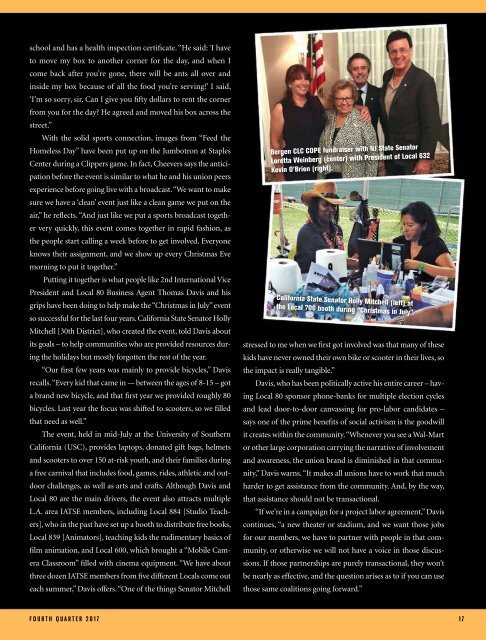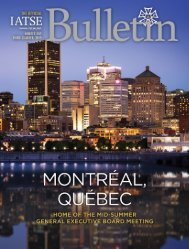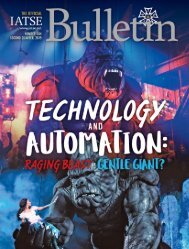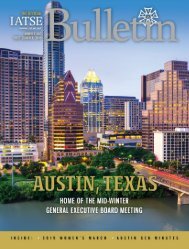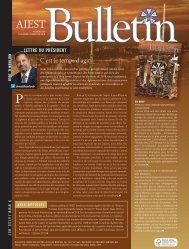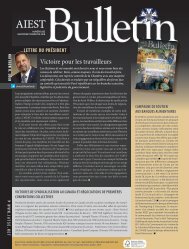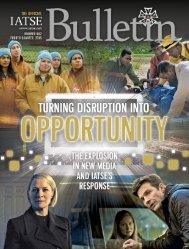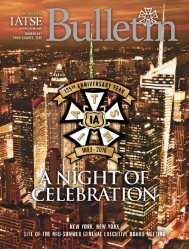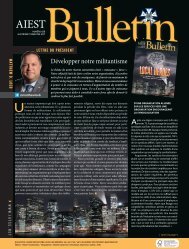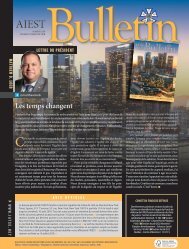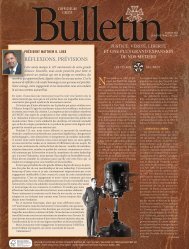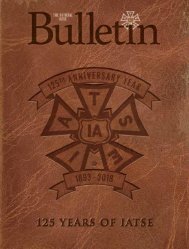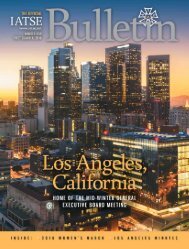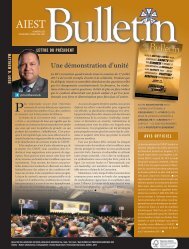You also want an ePaper? Increase the reach of your titles
YUMPU automatically turns print PDFs into web optimized ePapers that Google loves.
school and has a health inspection certificate. “He said: ‘I have<br />
to move my box to another corner for the day, and when I<br />
come back after you’re gone, there will be ants all over and<br />
inside my box because of all the food you’re serving!’ I said,<br />
‘I’m so sorry, sir. Can I give you fifty dollars to rent the corner<br />
from you for the day? He agreed and moved his box across the<br />
street.”<br />
With the solid sports connection, images from “Feed the<br />
Homeless Day” have been put up on the Jumbotron at Staples<br />
Center during a Clippers game. In fact, Cheevers says the anticipation<br />
before the event is similar to what he and his union peers<br />
experience before going live with a broadcast. “We want to make<br />
sure we have a ‘clean’ event just like a clean game we put on the<br />
air,” he reflects. “And just like we put a sports broadcast together<br />
very quickly, this event comes together in rapid fashion, as<br />
the people start calling a week before to get involved. Everyone<br />
knows their assignment, and we show up every Christmas Eve<br />
morning to put it together.”<br />
Putting it together is what people like 2nd International Vice<br />
President and Local 80 Business Agent Thomas Davis and his<br />
grips have been doing to help make the “Christmas in July” event<br />
so successful for the last four years. California State Senator Holly<br />
Mitchell [30th District], who created the event, told Davis about<br />
its goals – to help communities who are provided resources during<br />
the holidays but mostly forgotten the rest of the year.<br />
“Our first few years was mainly to provide bicycles,” Davis<br />
recalls. “Every kid that came in -– between the ages of 8-15 – got<br />
a brand new bicycle, and that first year we provided roughly 80<br />
bicycles. Last year the focus was shifted to scooters, so we filled<br />
that need as well.”<br />
The event, held in mid-July at the University of Southern<br />
California (USC), provides laptops, donated gift bags, helmets<br />
and scooters to over 150 at-risk youth, and their families during<br />
a free carnival that includes food, games, rides, athletic and outdoor<br />
challenges, as well as arts and crafts. Although Davis and<br />
Local 80 are the main drivers, the event also attracts multiple<br />
L.A. area <strong>IATSE</strong> members, including Local 884 [Studio Teachers],<br />
who in the past have set up a booth to distribute free books,<br />
Local 839 [Animators], teaching kids the rudimentary basics of<br />
film animation, and Local 600, which brought a “Mobile Camera<br />
Classroom” filled with cinema equipment. “We have about<br />
three dozen <strong>IATSE</strong> members from five different Locals come out<br />
each summer,” Davis offers. “One of the things Senator Mitchell<br />
Bergen CLC COPE fundraiser with NJ State Senator<br />
Loretta Weinberg (center) with President of Local 632<br />
Kevin O’Brien (right).<br />
California State Senator Holly Mitchell (left) at<br />
the Local 706 booth during “Christmas in July”.<br />
stressed to me when we first got involved was that many of these<br />
kids have never owned their own bike or scooter in their lives, so<br />
the impact is really tangible.”<br />
Davis, who has been politically active his entire career – having<br />
Local 80 sponsor phone-banks for multiple election cycles<br />
and lead door-to-door canvassing for pro-labor candidates –<br />
says one of the prime benefits of social activism is the goodwill<br />
it creates within the community. “Whenever you see a Wal-Mart<br />
or other large corporation carrying the narrative of involvement<br />
and awareness, the union brand is diminished in that community,”<br />
Davis warns. “It makes all unions have to work that much<br />
harder to get assistance from the community. And, by the way,<br />
that assistance should not be transactional.<br />
“If we’re in a campaign for a project labor agreement,” Davis<br />
continues, “a new theater or stadium, and we want those jobs<br />
for our members, we have to partner with people in that community,<br />
or otherwise we will not have a voice in those discussions.<br />
If those partnerships are purely transactional, they won’t<br />
be nearly as effective, and the question arises as to if you can use<br />
those same coalitions going forward.”<br />
FOURTH QUARTER 2017 17


